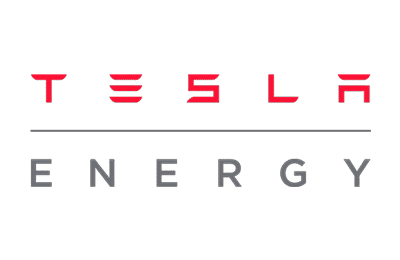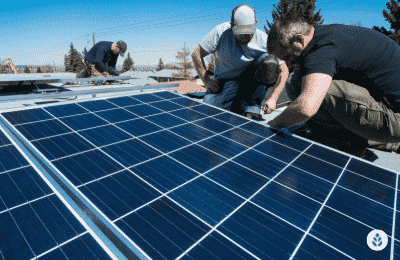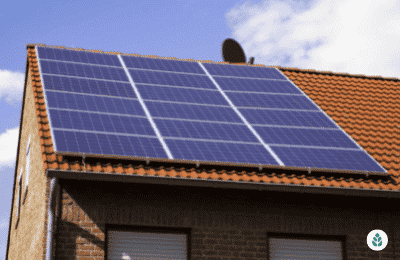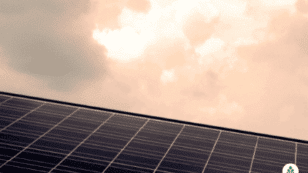 Reviews
Reviews
Top 7 Best Solar Companies in Massachusetts (2024 Reviews)
In this guide to the best solar companies in Massachusetts, you’ll learn:
- Which solar installers in Massachusetts are the most reliable and affordable?
- How can you save money when converting to solar in Massachusetts?
- What are the most important factors to consider when hiring a solar installation company in Massachusetts?
Each product and or company featured here has been independently selected by the writer. You can learn more about our review methodology here. If you make a purchase using the links included, we may earn commission.
Massachusetts has some of the highest electricity rates in the country, which makes it an ideal location to switch to solar. The average homeowner in the Bay State who switches to solar and purchases their panels in cash can expect to save an average of $48,909 over the course of their panels’ lifespan. Deciding to convert your home to solar power is usually an easy decision, but choosing a company to perform the installation is considerably more difficult.
This guide provides you with all the information you need to choose the solar installer that best meets your home’s needs. We cover the upfront costs of the equipment and installation, how each company’s efficiency ratings affect the long-term value of your system, and more.
What Are the Best Solar Companies in Massachusetts?
After countless hours of in-depth research and analysis, we arrived at the following list of the seven best solar companies in Massachusetts:
- SunPower: Best National Provider
- ADT Solar: Best Warranty Coverage
- Tesla: Best Technology
- Trinity Solar: Best Regional Provider
- Momentum Solar: Best Customer Service
- Boston Solar: Best Local Installer
- Great Sky Solar: Best Social Impact
Compare Massachusetts’ Top-Rated Solar Providers
SunPower and ADT are the two best solar installers in Massachusetts, in our expert opinion. The following table provides an overview of how the seven best companies compare to each other in a broad sense.
| Solar Providers | Superlative | Our Score | Avg Cost | Warranty | Financing Options | Get Quote |
| SunPower | Best National Provider | 5/5 | $$$$ | 40 years for equipment, workmanship and production | Cash, solar loan, solar lease, PPA | Get Quote |
| ADT Solar | Best Warranty Coverage | 4/5 | $$$ | 25 years for equipment, workmanship and production | Cash or solar loan | |
| Tesla | Best Technology | 4.5/5 | $$ | 25 years for equipment and performance; 10 years for workmanship | Cash, solar loan, solar lease, PPA | Get Quote |
| Trinity Solar | Best Regional Provider | 4/5 | $$$ | 25 years for equipment and production; 5 years for workmanship | Cash, solar loan, solar lease, PPA | Get Quote |
| Momentum Solar | Best Customer Service | 4.5/5 | $$$ | 25 years for equipment, production and workmanship | Cash, solar loan, solar lease, PPA | Get Quote |
| Boston Solar | Best Local Installer | 4/5 | $$$ | 25 years for equipment, and production, 10 years for workmanship | Cash, solar loan | Get Quote |
| Great Sky Solar | Best Social Impact | 4/5 | $$$ | 25 years for equipment and production | Cash, solar loan | Get Quote |

SunPower
Pros
- Most efficient panels on the market
- National coverage
- Cradle to Cradle sustainability certification
- Great warranty coverage
Cons
- Expensive
- Customer service varies by local dealer

Tesla Energy
Pros
- Price-match guarantee
- Sleek, efficient and durable solar panels
- Best solar battery on the market
Cons
- Some reported issues with customer service
- Customer service varies by local dealer
Tesla’s solar systems offer a level of integration between parts that other companies simply cannot match. Tesla’s panels offerings, Powerwalls, EV chargers and solar monitoring app are literally made to be used together, and the integrative features they come with are impressive.
Tesla doesn’t always have the best customer service, but it’s still an excellent option.
Why We Chose Tesla as the Best Technology
Tesla’s products offer some unique features that can make energy independence a little easier for Bay Staters.
For example, the Powerwall batteries let you prepare for blackouts and customize your system’s production settings, and they automatically store excess power if a storm is coming your way. You can set your system to optimize for either storage or savings, which can be especially helpful for mitigating the high cost of electricity in Massachusetts. This is a huge plus in Massachusetts, where weather can get extreme.
Tesla also offers one of the best EV chargers on the market, although it’s only compatible with Tesla’s EVs unless you have a special adapter. Thankfully, this is an affordable add-on product. And it’s a welcome one in the area since the state ranks fourth in the country in terms of EV adoption.
One of the best parts about choosing Tesla is that the company offers price matching, which makes its services extremely affordable. This is a big benefit in Massachusetts, where the cost of going solar is well above the national average.
What We Don’t Like
Our least favorite thing about Tesla is that the company outsources its installations to third-party contractors. While this isn’t inherently a bad thing, it means the service you get is highly variable and depends on the specific companies Tesla uses where you live. This makes it impossible to draw general conclusions about the service you’ll get when you purchase a Tesla system.
We also don’t love that Tesla only sells a single brand of equipment. This isn’t a huge deal since Tesla’s equipment offers above-average efficiency and unique features, but we still prefer companies that offer a wider selection of equipment.
Read our full review of Tesla for more information.
Solar Products
Tesla installs QCells panels that are extremely efficient and more than capable of providing enough energy to power your home, even with Massachusetts’ above-average rainfall and cloud cover.
The company also manufactures and sells solar roofs, which are by far the most popular solar shingle option on the market. A Tesla solar roof will cost you a pretty penny — especially in Massachusetts — but it’s more aesthetically appealing than a panel array, providing all the benefits of rooftop solar but with a sleeker appearance.
Tesla also provides the following selection of products and services:
- Tesla Powerwalls
- Tesla EV chargers
- Tesla solar monitoring app
As mentioned, the EV chargers are a nice addition in Massachusetts, as buying them with your panels instead of after lets you apply the ITC to them, effectively bringing down the cost by up to 30%. Batteries are also a nice-to-have now, but they could become necessary to see long-term solar savings if net metering in the state goes the way it has in other states, like California.
Financing Options
Tesla offers the four main payment options: cash, solar loan, solar lease and PPA. We recommend paying with cash or via a loan if you can. Both options lead to ownership and will save you the most money over the course of your system’s lifespan.
PPAs and leases are only a good option if you can’t afford to pay cash or won’t qualify for a loan. PPAs and leases won’t save you as much money and you don’t own the panels, which means that your panels won’t increase the value of your home.
Warranty Information
Tesla’s warranty covers equipment and production for 25 years and workmanship for 10 years. The performance guarantee is above average, but the equipment and labor coverage match the industry average.
Although the workmanship warranty is in line with the industry average, we’d really love to see lengthier coverage in a high-risk area like Massachusetts.
Facts and Figures: Tesla Energy
| EcoWatch Rating |
|---|
| Better Business Bureau (BBB) Rating |
| Average Cost ($-$$$$$) |
| Solar Services |
| 4.5 |
| C |
| $$ |
| Solar Panels, Solar Batteries, EV Chargers, Solar Roof Shingles, System Monitoring |

Trinity Solar
Pros
- Many financing options
- Family-owned and -operated
- Makes charitable contributions
Cons
- Limited service area
- Relatively short workmanship warranty
Trinity Solar has installed more than 80,000 solar panel systems throughout New England since 2014, making it intimately familiar with the finer details of going solar in Massachusetts.
The company’s warranty leaves much to be desired, but its experience and local focus is a reasonable tradeoff.
Why We Chose Trinity Solar as Best Regional Provider
Unlike the companies we’ve covered so far, Trinity Solar primarily installs solar systems in the Northeast, which means it’s more familiar with the specific challenges associated with installing solar panels in Massachusetts than a national installer.
Trinity’s technicians and installers are local experts who understand what Massachusetts homeowners need to get the most out of their solar systems. They can also help you save money by helping you take advantage of Massachusetts-specific solar incentives like the Solar Massachusetts Renewable Target (SMART) program and the Residential Renewable Energy Income tax credit.
There are local perks the techs might be more familiar with, as well, including incentives for efficiency upgrades from Hudson Light & Power, Concord Municipal Light Plant, Taunton Municipal Light Plant, Reading Municipal Light Department, Holyoke Gas & Electric, and Chicopee Electric Light.
Trinity also has a charity program that will donate $100 to a charity of your choice just for sitting down with a representative for a consultation. If you wind up installing a solar system from Trinity, the company increases its donation to $1,000. As such, the company has a positive impact on the community as well.
What We Don’t Like
The biggest downside to going with Trinity is the sub-par five-year workmanship warranty. We would much prefer to see Trinity offer at least a ten-year workmanship warranty, which is the industry average, or, ideally, something even longer.
Gambling with a shorter workmanship warranty may work out, but we don’t love the idea in a state that gets as much inclement weather as Massachusetts.
Otherwise, the only other thing you should know is that some customers report waiting longer than normal for warranty repairs.
Read our full Trinity Solar review for more information.
Solar Products
Trinity primarily installs QCells solar panels, which have an above-average 21.4% efficiency rating. This is only slightly below Maxeon’s efficiency ratings and should be more than enough to cover your energy bills in Massachusetts.
A big advantage of installing panels made by QCells is that they’re more affordable than panels from competing brands like Silfab, Canadian Solar and REC. This can be especially helpful in a state like Massachusetts, where solar equipment is significantly more expensive than average.
Trinity Solar installs a range of equipment and offers various services, including the following:
- Tesla Powerwalls
- Generac solar batteries
- Enphase and Tesla solar monitoring apps
Battery options are always nice, but they could become more valuable if the net metering credit rate ever dips in the area and demands batteries to see significant solar savings.
Financing Options
Trinity Solar customers can pay for their panels in cash, finance them with a loan or enter into a solar lease or PPA. We recommend paying in cash or via a loan since they offer better long-term savings than leases or PPAs.
However, the last two options come with the lowest costs, so they help make Trinity’s products and services more widely available. This is especially true in a state like Massachusetts, where solar equipment is relatively expensive, and it helps future-proof the company in case batteries ever become necessary and drive up installation costs.
Warranty Information
Trinity Solar’s warranty covers equipment and energy production for 25 years, but the company only offers a five-year workmanship warranty. The equipment warranty is average, and the energy-production guarantee is slightly above average, but the workmanship coverage is half of the industry standard.
We’d really like to see lengthier workmanship warranty coverage in a high-risk state like Massachusetts, although we do believe the company’s local experience should help provide some peace of mind.
Facts and Figures: Trinity Solar
| EcoWatch Rating |
|---|
| Better Business Bureau (BBB) Rating |
| Average Cost ($-$$$$$) |
| Solar Services |
| 4 |
| A+ |
| $$$ |
| Solar Panels, Solar Batteries, Energy-Efficiency Upgrades |

Momentum Solar
Pros
- Great warranty coverage
- Concierge service ensures steady communication
- Representatives are experts on local policies
Cons
- Slightly limited service offerings
- Only available in 11 states
Momentum is known throughout the solar industry for its renowned customer service. The company’s concierge service guarantees that you’ll only have one point of contact with the company throughout your installation, making the installation process more streamlined and less confusing.
Momentum was named in a racial discrimination lawsuit and recently settled, which is a pretty significant social downside related to this company.
Why We Chose Momentum as the Best for Customer Service
Momentum is one of the few large solar installation companies that manage to provide outstanding customer service. Customer reviews of Momentum Solar all mention how easy it is to get in touch with the company when they have questions or need to make a warranty claim.
Momentum’s concierge service puts you in touch with a single representative who handles your entire installation from start to finish. This gives Momentum unparalleled continuity of service and makes it easy to communicate with the company.
The care and attention to detail that Momentum provides are especially valuable when it comes to taking the most advantage of Massachusetts’ many solar incentives and tax credits. It’s nice to have a responsive company in your corner that can help you every step of the way.
What We Don’t Like
One pretty significant drawback to choosing Momentum is that the company was recently involved in a racial discrimination lawsuit. The allegations weren’t substantiated, but the company did settle. Of course, we prefer that the company wasn’t involved to begin with.
The company also lacks system customization. It carries relatively few products compared to its competition, only offering solar panel and solar battery installations. If you have an EV and want to install an EV charger in your home, you’ll have to go with another company. This is a major drawback to Momentum in a region like Massachusetts, where most people plan to own an EV in the near future.
Read our full review of Momentum Solar for more information.
Solar Products
Momentum offers a variety of panels from several manufacturers and doesn’t work with a limited selection of brands. The company only installs tier-one panels, which means pretty much all of the systems the company installs will work well in Massachusetts, where high-efficiency panels are a must.
One of the biggest advantages you get from Momentum’s wide selection of brands is the ability to prioritize upfront cost savings or long-term energy savings, depending on what you want. Choosing a lower-cost solar panel brand will make going solar more affordable, while purchasing a more efficient option will boost your lifetime savings.
In addition to solar panels, Momentum also offers the following products and services:
- Enphase solar batteries
- The Enphase solar monitoring app
The batteries will be a nice addition to have access to if net metering ever declines in the area, although we do wish there were EV chargers available as well, as that would allow customers to upgrade and apply the ITC to that piece of equipment, too.
Financing Options
No matter what type of system you choose, Momentum very likely has a financing option that will work for your budget. The company accepts cash, loans, leases and PPAs.
We don’t recommend choosing a lease or PPA if at all possible, as these prevent you from taking the federal tax credit. Purchasing your panels outright in cash or financing them with a loan will reap the greatest reward and make you eligible for the tax credit. Plus, paying in cash or with a loan will boost your home value, whereas a lease or PPA would not.
Still, the availability of options is great to see, and it will be especially helpful if batteries become the norm like we’re expecting and drive up installation costs by the average of $10,000 to $20,000.
Warranty Information
Momentum’s warranty covers its equipment, workmanship and energy production for 25 years. The equipment and labor warranty matches the industry average, but the production guarantee is more than twice as much as the usual ten years most companies provide.
In a state like Massachusetts, where electricity costs are significantly higher than the national average, a 25-year production guarantee is a major advantage. Plus, the labor warranty provides some peace of mind, even when the weather gets bad.
Facts and Figures: Momentum Solar
| EcoWatch Rating |
|---|
| Better Business Bureau (BBB) Rating |
| Year Founded |
| Average Cost ($-$$$$$) |
| Solar Services |
| Brands of Solar Equipment Offered |
| Warranty Coverage |
| 4.5 |
| A+ |
| 2009 |
| $$$ |
| Solar Panels, Solar Batteries |
| Q Cells, REC, Trina Solar, Jinko Solar, Canadian Solar and others depending on location |
| 25-year manufacturer and workmanship warranties |

Boston Solar
Pros
- Excellent reputation
- Outstanding workmanship
- Representatives are experts on local policies
Cons
- Slightly limited service area
- May not carry popular equipment brands
Boston Solar holds the honor of being the premier residential solar installer in Massachusetts, with more than 5,000 residential solar installations performed over its 11-year history.
The company’s warranty is a little lacking, and its selection isn’t as extensive as what you find from some larger companies, but we still highly recommend considering this company.
Why We Chose Boston Solar as the Best Local Installer
Boston Solar is based in Massachusetts and performs all of its installations using an in-house team of experts. The company’s technicians know what Massachusetts homeowners need from a solar installation and are an excellent resource for navigating Massachusetts’ sometimes-confusing solar laws and incentives.
The company’s warranty is in line with the industry standard, and its range of services includes unique options suited for Massachusetts homes, like installing critter guards and snow guards.
Contacting Boston Solar is easy, and the company is more responsive than larger companies. Customer reviews indicate that the company processes warranty claims quickly and that the customer support staff is both friendly and knowledgeable.
One aspect of using a smaller company like Boston Solar is that the company and the people who work there are part of the community. The company also gives back to the community by partnering with the Red Sox to help raise awareness of the benefits of going solar in Massachusetts.
What We Don’t Like
Choosing a local installer like Boston Solar requires making some tradeoffs. The company’s prices are a bit higher than the prices of its larger competitors, which can pose a problem for budget-conscious shoppers. This is especially true, given that the cost-per-watt for solar in Massachusetts is quite high to begin with.
Additionally, the company’s selection is limited compared to a larger installer like ADT, Trinity or Momentum. Most homeowners will find something that suits their needs from Boston Solar, but they won’t have as many choices as they would with larger providers.
Solar Products
Boston Solar used to partner with LG to source its panels, but with the latter company ceasing its solar panel manufacturing in 2022, Boston Solar now installs a variety of tier-one panels from several manufacturers. It prefers to use Trina panels, which have an above-average efficiency rating, but it can also provide access to other brands that might suit your needs better.
Keep in mind that Trina panels have an above-average per-watt cost, so they might be prohibitively expensive in Massachusetts, where photovoltaic (PV) equipment is already more expensive than normal.
The company also offers the following products and services:
- Enphase batteries
- Tesla Powerwalls
- Enphase and Tesla solar monitoring apps
We love the variety of batteries offered by Boston Solar, and this will probably be more beneficial to customers in the future, given the way the net metering policies have been changing across the country. We would love to see this installer add EV chargers, though.
Financing Options
Boston Solar accepts cash and solar loans but doesn’t offer leases or PPAs. We recommend paying in cash or taking out a solar loan anyway, so this isn’t a major drawback. However, if you can only afford to install solar using a lease of PPA, you’ll have to look elsewhere. There’s a greater possibility that will be the case if net metering ever declines like it has in other states.
A cash purchase will lead to the shortest possible panel payback period, and it will yield the highest savings overall. Loans are more accessible and still provide great benefits, but the interest will cut into your energy savings over time.
Warranty Information
Boston Solar’s warranty covers equipment and panel production for 25 years. The company also offers a 10-year workmanship guarantee. The equipment and labor warranties are average, but the production warranty is a little longer than most companies offer.
Boston Solar’s warranty coupled with its excellent customer service and local insight should give Massachusetts customers the confidence that their systems will continue to produce energy and save them money for years to come, no matter what problems should arise. Still, we would like to see a lengthier labor warranty to keep customers adequately protected through the extreme weather in the area.
Facts and Figures: Boston Solar
| EcoWatch Rating |
|---|
| Better Business Bureau (BBB) Rating |
| Average Cost ($-$$$$$) |
| Solar Services |
| 4 |
| A+ |
| $$$ |
| Solar Panels, Solar Batteries, EV Chargers, System Monitoring |
Watch Below: Learn Which Solar Incentives to Claim in Massachusetts To Maximize Savings
How Can You Save Money When Hiring A Solar Company In Massachusetts
There are a few ways to save money when converting to solar in Massachusetts, which most residents will want to take advantage of. The average cost of installing solar equipment in Massachusetts is around $24,180. This assumes the average local cost of $3.72 per watt and the typical system size of 6.5 kilowatts (kW).
The per-watt price in Massachusetts is well above the national average of $3.33, although the all-in cost is a few thousand below the U.S. average. This is due to Bay Staters using below-average amounts of electricity each month and requiring smaller systems than most Americans.
Still, the upfront price of solar in Massachusetts can be prohibitively expensive on its own, in which case we recommend considering the below tips to help bring your all-in costs down and raise your long-term savings:
- Take advantage of the two tax credits and other incentives available in Massachusetts
- Choose a high-efficiency panel brand
- Size your system appropriately
- Get multiple quotes
Take Advantage of the Available Solar Incentives
In our opinion, the best way to keep the cost of your solar panel system to a minimum is to make sure you take advantage of the many incentives Massachusetts has to offer for PV equipment. We’ll include a quick breakdown of the incentives offered to Bay Staters below, but you can get more information by checking out our guide to solar benefits and incentives in Massachusetts.
| Massachusetts Solar Incentive | Program Overview |
| Federal Solar Investment Tax Credit (ITC) | The federal tax credit provides a credit to your income tax burden for the year your system is installed and commissioned. The credit is for 30% of your system cost, or an average of $7,254 in Massachusetts. |
| Massachusetts Residential Renewable Energy Income Tax Credit | A state tax credit that provides a credit to your income taxes for the year your system is installed. This credit is for up to 15% of your system cost or $1,000, whichever is lower. Most residents will get the maximum of $1,000. |
| Solar Massachusetts Renewable Target (SMART) Program | This program pays you for every kilowatt-hour (kWh) you generate with your system for the first ten years. This will could save the average customer up to $1,800 per year, although there is limited space in the program, and the state website mentions that some incentives will be $0 per year due to the demand. |
| Massachusetts Property-Assessed Clean Energy (PACE) Financing | Offers a low-cost, low-APR financing solution for low-income households looking to convert to solar. |
| Massachusetts Sales Tax Exemption for Solar Equipment | The 6.25% state sales tax is waived on all solar equipment in MA, including panels, inverters, batteries, EV chargers and more. This can bring down your upfront costs by an average of over $1,511 in Massachusetts. |
| Massachusetts Property Tax Exemption for Solar Equipment | Massachusetts doesn’t include the value of your PV equipment when evaluating your property taxes. As a result, your taxes won’t increase just because you go solar. |
| Net Metering | Net metering credits you for all excess energy you produce with your panels and return to the electric grid. Those credits can offset any energy you pull from the grid, which is extraordinarily helpful in Massachusetts, where the energy rates are so high. |
| Local Incentives | Several utility companies in Massachusetts offer rebates for solar conversion. These include Hudson Light & Power, Concord Municipal Light Plant, Taunton Municipal Light Plant, Reading Municipal Light Department, Holyoke Gas & Electric and Chicopee Electric Light. |
Choose a High-Efficiency Panel Brand
Next, we recommend you opt for a high-efficiency solar panel brand when converting to solar energy in Massachusetts. The state receives around the average number of sunny days per year — 197 as opposed to 205 in the rest of the country — but maximizing energy production is essential for minimizing your energy bills.
Massachusetts residents pay an average of 27.46 cents per kWh, which is nearly double the national average of 16.79 cents.3 Despite residents using far less energy than average, they still see the fourth-highest monthly energy bills in the nation as a result of the per-kWh cost — an average of $165.31 per month.
Opting for a high-efficiency panel like SunPower, Panasonic or Tesla will likely drive up your initial costs. However, these options will more swiftly pay for themselves over time, as they will provide more energy for the space, boosting your long-term energy savings.
Size Your System Appropriately
The size of your rooftop solar system should be based on your monthly energy consumption, your home size, how much sunlight your roof gets and more. Unfortunately, undersizing your system can lead to paying for a solar system and an expensive utility bill, and oversizing it means you’ll unnecessarily pay for more expensive equipment with no upside.
We recommend choosing one of the reliable and experienced installers we’ve mentioned above. These companies all have technicians who understand the needs of Massachusetts property owners and can ensure your photovoltaic system is sized accordingly.
Get Multiple Solar Quotes
Finally, we recommend getting a few quotes from different companies to save money on your system.
Massachusetts is home to over 195 solar providers, all of which charge different prices for labor, carry different equipment and offer varying levels of help in taking advantage of local incentive programs. These seemingly small differences can lead to paying hundreds or even thousands of dollars less for your system.
As such, we suggest you get a few quotes and compare them based on the overall cost and the quality of the equipment and service you get for the price.
For more information about how to estimate the cost of your solar equipment and how to save throughout the installation process, you can use our solar calculator.
Will Solar Increase Your Home Value In Massachusetts?
Yes, installing solar panels on your home is expected to make it more valuable in Massachusetts.
While there are a few things to consider when estimating the value added, research conducted by Zillow suggests that homes with panels are around 4.1% more valuable.4 In MA, where the average property value is approximately $585,959, that’s a bump of about $24,024.5
One thing to consider is that some property owners inevitably won’t like the appearance of solar panels, especially on the front of the home. As solar is becoming more widely popular in Massachusetts — with more installations occurring in 2024 than any of the previous five years — that stigma is expected to change, which means solar may boost value even more going forward.
Another thing to consider is that solar is more popular — and more valuable — in high-density areas, which often have above-average energy rates as well. It’s reasonable to expect a higher value increase in more populated cities like Boston, Marlborough and North Andover.
Should Massachusetts Residents Hire a Professional Solar Installer Or DIY?
In most cases, we strongly recommend hiring a professional rather than trying to save money with a DIY solar installation. Although DIY installation is more affordable, there are a few reasons we recommend against it. We’ll discuss these briefly below.
Panel Efficiency
First off, DIY panels usually have a lower efficiency rating than professionally-installed panels. In an area like Massachusetts, where electricity rates are abnormally high, getting every drop of efficiency out of your panels is crucial for saving money over time.
While DIY panels might be more affordable upfront, the lower efficiency will very likely diminish your long-term energy savings and could end up being more expensive overall.
Warranty Coverage
Secondly, DIY panels often have far less attractive warranty coverage, and you get no coverage for the labor since you’ll be doing the work yourself.
Professional installers can offer up to 30 years of coverage for physical damage, energy production and labor. DIY panels often have up to 10 years for physical damage and efficiency and offer no labor coverage.
Massachusetts is prone to hurricanes, tropical storms and nor’easters that can put your panels at risk of damage and your roof at risk of leaking.6 As such, robust warranty coverage can end up saving you the cost of replacing or repairing your system or your home and end up being more affordable over time.
Installations Require Permits
Finally, all municipalities in MA require building permits for solar system installations. Not only can the permitting process be challenging to navigate for those unfamiliar, but you can also run into issues with your own installation that could cause delays in your project. In some cases, you may need to hire a professional after all to get the installation up to code.
In either case, going through the permitting process yourself can be time-consuming and expensive. We recommend saving yourself the headache and paying a premium to have an experienced professional do the work and the permitting for you.
What Should Massachusetts Residents Look For in a Solar Installer?
Choosing a single installer out of the 150+ that serve Massachusetts is difficult, but there are a few factors we recommend you prioritize. Narrowing your search based on the below things will help you choose an installer that will provide a positive experience and maximize your savings:
- Solar panel pricing
- Warranty coverage
- Local experience
- Reputation and customer reviews
Solar Panel Pricing
One of the first things we recommend you look at is the average cost per watt of a company’s equipment and what you get for that price. This is important everywhere but especially in Massachusetts, where the cost per watt is the third-highest in the country.
In addition to the cost of the equipment, we suggest you consider the quality of the panels and the service. Paying more for one of the best solar products is often a good financial decision in the long run.
Warranty Coverage
Next, we suggest you consider warranty coverage — and read the fine print. Solar warranties cover some combination of the following:
- Physical damage to your panels
- The efficiency of the equipment
- The labor charges included in the installation cost
All of these are important, but we suggest you prioritize efficiency and labor. High-efficiency panels are more likely to save you on energy bills over time. Workmanship warranties will also help reduce the risk of roof leaks and other issues, an important thing to consider in MA, where the average rainfall is around 1.5x the national average.7
Local Experience
With the demand for solar conversion growing in Massachusetts, more and more companies are popping up to turn a profit. While this indicates a strong local solar market, it also puts unwitting customers at risk of below-average customer service and voided warranties from newer companies that don’t last.
We suggest you choose a company that has been serving the Bay State for at least five years. This gives you a better chance of the installer sticking around but also helps you choose one that understands local needs and can size your system appropriately.
Reputation and Customer Reviews
Finally, we suggest you look at the company’s overall reputation and read through some online reviews. Getting a sense of the quality of service and communication you can expect from an installer can help you weed out companies that are less likely to provide a positive experience.
Methodology: How We Reviewed the Best Solar Companies in Massachusetts
Massachusetts is home to over 190 solar installers, meaning the competition is fierce. To find the best of the best to recommend to homeowners like you, we ranked each company based on six main factors that we believe are the most crucial for ensuring you get the best system and best service available. We’ll explain our ranking system below.
- Local reputation and reviews (20%): With such a high demand for solar equipment in Massachusetts, there’s a ton of competition. Unfortunately, that means a lot of companies pop up to take advantage and turn a profit and, in doing so, neglect to provide high-quality service and systems. We read through dozens of customer reviews for every company we research to see where each one shines and where it could improve. This ensures that we only provide high-quality installers that are likely to meet and exceed your expectations.
- Pricing and financing (20%): As mentioned above, the per-watt cost of PV equipment in Massachusetts is significantly higher than the national average. In fact, it’s the third-most expensive state for solar equipment on a per-watt basis. Companies that maintain average or below-average pricing make going solar more affordable, which is important in a high-cost area like Massachusetts. Along with high installation prices comes less accessibility. We prioritize companies that accept a variety of payment options, as this helps make the company a realistic option for more homeowners throughout the state.
- Services offered (20%): While solar batteries aren’t terribly popular in Massachusetts due to the great net metering program in the state, lots of solar customers choose to couple their panels with other add-on products. EV chargers are especially popular, as are energy efficiency home improvements, given the high cost of energy in the Bay State.
- Warranty coverage (20%): Massachusetts residents see their fair share of extreme weather, and they experience around 1.5x the national average amount of rainfall. Severe weather and frequent exposure to moisture put rooftop solar panels at an elevated risk of damage. We prefer companies that offer robust workmanship warranties to provide some peace of mind, given these conditions. Efficiency and equipment warranties are also helpful for protecting the high-cost systems in the area.
- Company experience (10%): In areas like Massachusetts, which have a lot of competition in the solar industry, we shy away from younger companies that don’t have the same experience as those with some longevity. Not only are they less likely to understand the specific needs of residents in the area, but they’re also more likely to go out of business. Importantly, a company’s workmanship warranty only lasts for as long as the company is in business.
- Brand quality (10%): Finally, we consider the solar equipment brands offered by each provider. We love when companies install high-quality, high-efficiency panels, but we also prioritize companies that include a selection of brands, ranging from inexpensive to highly efficient. This helps keep options open for customers with different needs.
Read More About Going Solar in Massachusetts
- Is Solar Worth It in Massachusetts?
- Massachusetts Solar Incentives Guide
- Find Cost Savings on Solar Panels in Massachusetts
The cost information presented in this article is derived from a comprehensive analysis, incorporating data from multiple industry sources. The average cost per watt per state was calculated based on figures from Consumer Affairs, Energy Sage, and Berkeley Lab’s Electricity Markets & Policy Department. Additionally, monthly energy consumption and the average monthly cost of electricity were sourced from the U.S. Energy Information Administration, ensuring a well-rounded and accurate representation of the information presented.
FAQ: Best Solar Companies in Massachusetts
Given the popularity of solar in Massachusetts, we get lots of questions about how to choose an installer in the area. Below, we’ll answer some of the most common questions we see from residents in your area.
In our opinion, SunPower is one of the most reputable solar installers in Massachusetts. SunPower has been dominating the national solar industry since 1985, so it has decades of experience sizing systems and providing outstanding customer service.
SunPower also offers some of the highest-efficiency equipment available on the market, as well as one of the best warranty packages available. Although its prices are above-average, we feel comfortable recommending this installer to any homeowner in Massachusetts who can afford it.
However, if you prefer to opt for the local option, we recommend connecting with Green Power Energy, ACE Solar or Boston Solar — whichever is closest to you.
Yes, absolutely! PV panel brand selection matters for two primary reasons.
First, the brand of panel you install will play a role in how much of the available sunlight your system can convert into energy. The efficiency rating of your panels will affect your long-term savings, which is a crucial thing to consider when going solar in any state.
Second, different panels come with different warranty coverage options. In a state like MA, where extreme weather is common, a panel that has a lengthy and robust physical protection warranty will usually be a better option.
Ultimately, we recommend prioritizing panels that have an above-average efficiency rating and a long-standing warranty for the best experience and the highest savings over time.
Finding the most affordable installer in Massachusetts involves getting quotes from all of the providers that service your area and comparing them based on an equivalent system size and quality.
This is not only a time-consuming process, but it often doesn’t lead to the most value or the highest savings from your panels.
We recommend instead looking at reputable installers that provide high-quality equipment and above-average customer service. Paying a bit more upfront for these installers can often lead to greater long-term savings and a better experience overall.
Top Solar Installers in Massachusetts Cities
Comparing authorized solar partners
-
- Most efficient panels on the market
- National coverage
- Cradle to Cradle sustainability certification
- Great warranty coverage
- Expensive
- Customer service varies by local dealer
A+Best National Provider1985SunPower25-year all-inclusive warranty
Having trouble deciding? Click below and use our process to receive multiple quotes instead:

 233k
233k  41k
41k  Subscribe
Subscribe 












